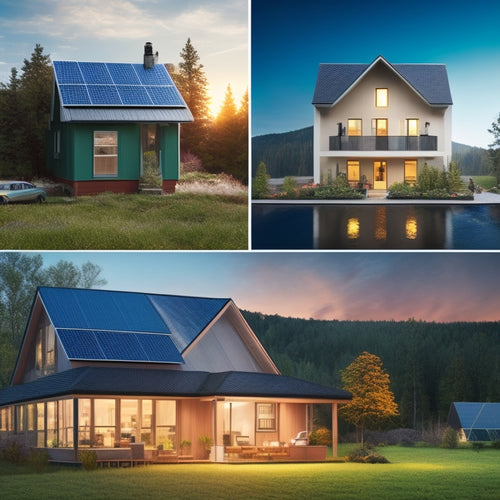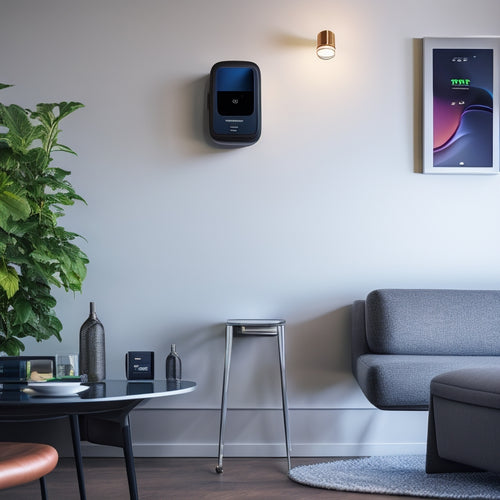
Top-Rated Sustainable Hot Water Systems: Installation Guide
Share
When it comes to installing a sustainable hot water system, you'll want to evaluate energy-efficient options that reduce your carbon footprint. Tankless systems, solar water heaters, and heat pumps are top contenders, each with their unique benefits and drawbacks. Look for systems with high Energy Factor (EF) ratings, low NOx emissions, and recyclable materials. Proper installation and maintenance are essential to maximizing performance and longevity. By understanding the features and requirements of each system, you can make an informed decision that meets your needs and budget. Now, take a closer look at the top brands and products to find the perfect fit for your sustainable hot water needs.
Key Takeaways
- When selecting a sustainable hot water system, consider energy efficiency, eco-friendly features, and high Energy Factor (EF) ratings for reduced energy waste.
- Tankless systems heat water on demand, reducing energy consumption, while solar water heaters utilize thermal energy from the sun for heating.
- Proper installation is crucial for maximizing performance and longevity, including insulating pipes, well-ventilated positioning, and regular inspections.
- Top brands like Rheem, Bosch, and Stiebel Eltron offer varying warranty lengths and features, such as energy efficiency and noise levels, to consider.
- Compatibility with existing plumbing and electrical infrastructure is essential, and installation costs can range from $500 to over $50,000 based on complexity.
Energy-Efficient Hot Water System Reviews
When it comes to selecting an energy-efficient hot water system, you're likely to be overwhelmed by the numerous options available in the market.
You need to contemplate factors like energy consumption, cost, and eco-friendly features. Before making a decision, it's crucial to assess energy needs and infrastructure and evaluate the building's infrastructure to guarantee it can support the added electrical load.
Tankless options, for instance, are gaining popularity due to their ability to heat water only when needed, reducing energy waste. Look for systems with high Energy Factor (EF) ratings, which indicate their energy efficiency.
Additionally, think about systems with eco-friendly features like low NOx emissions, recyclable materials, and reduced water waste. By evaluating these factors, you can make an informed decision that aligns with your values and contributes to a more sustainable future.
Solar Water Heaters: How They Work
Nearly 80% of households rely on traditional electric water heaters, which consume a substantial amount of energy. However, you can break free from this energy-intensive cycle by opting for solar water heaters.
These systems utilize thermal energy from the sun to heat your water, reducing your reliance on non-renewable energy sources. In addition, solar-powered systems can future-proof your business by adapting to regulations and consumer preferences renewable energy solutions, and they can also increase property value with sustainable energy solutions.
Here's how they work:
- Solar collector types, such as flat-plate or evacuated tube collectors, absorb sunlight and convert it into thermal energy.
- This energy is then transferred to a fluid, which flows through a heat exchanger, warming the water in your tank.
- The heated water is then distributed to your home, providing you with a sustainable and eco-friendly hot water supply.
- Solar water heaters can be configured for both residential and commercial use, making them a versatile option.
- With proper installation and maintenance, solar water heaters can last for up to 20 years, providing you with a long-term solution for your hot water needs.
Heat Pumps: Benefits and Drawbacks
Your water heater's efficiency can take a significant leap forward with heat pumps, a technology that makes use of ambient heat from the air and upgrades it to provide hot water.
This innovative system can provide you with substantial cost savings, as it's up to 4 times more efficient than traditional electric water heaters. In addition, heat pumps have a minimal environmental impact, reducing your carbon footprint and contributing to a cleaner planet.
By integrating heat pumps with renewable energy integration, you can additionally reduce your reliance on the grid and lower your energy bills. Furthermore, government incentives and tax credits can help offset the initial investment costs.
However, you should be aware that heat pumps can be noisy and may not perform at their best in extremely cold temperatures. Additionally, the initial investment can be higher than traditional systems, although long-term savings often justify the cost.
Installation and Maintenance Tips
To maximize the benefits of heat pumps, proper installation and maintenance are essential. You'll want to verify that your system is installed correctly to optimize its performance and longevity.
When it comes to installation techniques, consider the following:
- Insulate pipes to minimize heat loss and reduce energy consumption
- Optimize array design, as seen in solar panel optimization, to enhance energy production and reduce waste.
- Position the heat pump in a well-ventilated area to guarantee efficient air flow, and select energy-efficient equipment to minimize losses.
- Connect the system to a timer or thermostat to regulate temperature and energy usage
- Confirm proper drainage and piping to prevent corrosion and damage
- Regularly inspect and clean the system's filters to maintain efficiency and prevent clogs
Top Brands and Product Comparisons
Several top brands dominate the market for heat pump hot water systems, each offering unique features, benefits, and price points.
You'll want to take into account brand reliability and product warranties when making your decision. Rheem, for instance, offers a 10-year warranty on their heat pump systems, while Bosch provides a 5-year warranty. Apricus and Stiebel Eltron offer 5-year and 7-year warranties, respectively.
When comparing products, look for features like energy efficiency, noise levels, and hot water storage capacity.
Additionally, the installation costs of these systems can range from $500 to $50,000+, depending on the complexity of installation, which affects the overall budget.
You'll also want to take into account the system's compatibility with your existing plumbing and electrical infrastructure.
Frequently Asked Questions
Can I Install a Sustainable Hot Water System in an Existing Home?
You can install a sustainable hot water system in your existing home, but be prepared to overcome installation challenges, such as retrofitting piping and insulation, to achieve ideal energy efficiency and freedom from utility bills.
Are Sustainable Hot Water Systems Compatible With Well Water?
You're probably wondering if sustainable hot water systems are compatible with well water - and the answer is a resounding yes! In fact, these systems thrive with well water, leveraging its natural mineral content to enhance efficiency and extend equipment lifespan.
Do Sustainable Hot Water Systems Require Special Plumbing or Piping?
When you install a sustainable hot water system, you'll need to evaluate plumbing materials that prioritize energy efficiency, such as PEX or copper pipes, which can withstand high water pressure and temperatures while minimizing heat loss and environmental impact.
Can I Use a Sustainable Hot Water System for Space Heating Too?
You can use a sustainable hot water system for space heating, but you'll need to guarantee the system is designed for both tasks, prioritizing energy efficiency and regular system maintenance to maximize its performance and freedom from high energy bills.
Are There Any Government Incentives for Sustainable Hot Water System Installations?
You'll be glad to know that, yes, you can benefit from government rebates when installing energy-efficient sustainable hot water systems, which can help offset the initial cost and support your eco-friendly lifestyle.
Related Posts
-

What Does Your Home Energy Audit Report Reveal?
Your home energy audit report reveals a detailed analysis of your energy consumption patterns, highlighting areas of ...
-

7 Best EV Battery Health Trackers for Homeowners
You can maximize your electric vehicle's performance and lifespan by leveraging advanced battery health trackers that...
-

Transform Your Outdoor Space With Recycled Plastic Lumber
By incorporating recycled plastic lumber into your outdoor design, you're not just building a deck or installing a fe...


